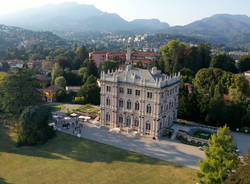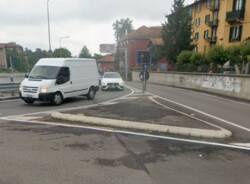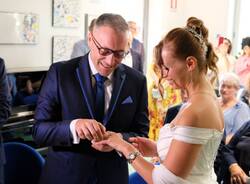Where do the small ones go? The “on the road” economy
The journalist with Corriere della Sera, Dario Di Vico, presented his latest book: “Cacciavite Robot e Tablet”, at Faberlab in Tradate.
Which direction is the country of small businesses, which produces, innovates, and exports its knowhow, with little fuss, often accompanied only by a suitcase and a good dose of “adventurous spirit”, going in? A number of answers were provided by Dario Di Vico, one of the leading journalists at the newspaper “Corriere della Sera” and co-author, with the economist Gianfranco Viesti, of “Cacciavite Robot e Tablet” (Screwdrivers, Robots and Tablets), which was presented yesterday, Friday 6 February, at Faberlab in Tradate, the digital workshop that was created from an idea of the association of SMEs, Confartigianato Imprese Varese.
A meeting chaired by the deputy editor of VareseNews, Michele Mancino, in the company of the businessmen Alessio Travetti and Simone Maccagnan, focused on a number of topics central to the relaunch of a country affected by “industrial dwarfism”, that, despite ruthless Darwinian selection, is able to withstand the great crisis.
Innovation, internationalisation and active policies that support businesses were the main points of the conversation, in which the National Chairman of Confartigianato, Giorgio Merletti, and the Chairman of Confartigianato Imprese Varese, Davide Galli, also took part.
In order to understand Italy today, we must “consider the small businesses of the past,” Di Vico began. “People were spurred on by a desire to achieve wellbeing, an improvement in their economic situation, as well as by their entrepreneurial drive. Today, small businesses are faced with a different, anthropological situation, and we cannot take it for granted that the movement of start-up companies will generate a new economic cycle.
“The businessman of the past was good at overcoming significant challenges, but standardised production and, therefore, the opportunity to imitate, played in his favour. Today, we face a new, technological discontinuity, in which we have to deal with a much bigger market, in which human capital has a prominent role.”
Di Vico continued. “Italians are excellent manufacturers, but once the product has been made, they don’t know how to sell or distribute it.” And these two factors penalise the recovery and, if compared with the French large-scale retail trade (Decathlon, Carrefour, Leroy Merlin, to mention but a few), bring the discussion back to the notorious “Italian dwarfism” that afflicts our manufacturing system.
But how do we administer the right hormones to achieve growth of the country? Opinions differ on this matter. According to Simone Maccagnan, the owner of Gimac, in Castronno, being small also means being agile in the market, independent when choices have to be made, personal in working relationships.
According to Alessio Travetti, of the company Travetti, in Arcisate, small is synonymous with quality, which is acknowledged and appreciated by the large multinationals, who hunger for the “Made in Italy” label, and who stock up from him.
And it is here that another important topic was introduced, namely investments. According to Di Vico, the multinationals that decide to invest in Italy (Whirlpool is a case in point) should not frighten small businesses. “We never talk about the Italian companies that buy abroad, but when a foreign company comes to Italy, it causes nationwide alarm. And yet, it is in this direction that the market is going: towards concentration.”
According to the journalist, in order to protect the manufacturing system, all that is necessary is “an active policy that protects businesses”, that establishes parameters that classify large, pro-territory businesses.
“This discussion is not only linked to the employment opportunities that the big companies can offer,” Di Vico said, “but also to all of those services that can be generated by the network between a large company and small, or start-up businesses operating around it.”
And here is the rub: this policy is all too often absent and contradictory, and “says it all, and the opposite of it all,” as the Chairman of Confartigianato Giorgio Merletti claimed at the end of the debate.
And this is maybe why we manage to speak about industrial policy and the country’s relaunch better in Varese than in Rome.
TAG ARTICOLO
La community di VareseNews
Loro ne fanno già parte
Ultimi commenti
Paolo Cottini su Colle di Biumo, il 5 gennaio la conferenza di VAS a Varese per decidere il futuro dell'area
angelo_spiteri su Il Comitato varesino per la Palestina torna in piazza: "Non ci fermiamo nemmeno a Natale"
axelzzz85 su I sindacati dei frontalieri contro il decreto sulla tassa della salute: “Andremo alla Consulta”
robertolonate su Il Natale che non si vede
robertolonate su Il Natale che non si vede
Alessandro Zanzi su A Varese Confcommercio chiede la sospensione dei lavori della ciclabile in viale Belforte, il Comune fissa un sopralluogo
















Accedi o registrati per commentare questo articolo.
L'email è richiesta ma non verrà mostrata ai visitatori. Il contenuto di questo commento esprime il pensiero dell'autore e non rappresenta la linea editoriale di VareseNews.it, che rimane autonoma e indipendente. I messaggi inclusi nei commenti non sono testi giornalistici, ma post inviati dai singoli lettori che possono essere automaticamente pubblicati senza filtro preventivo. I commenti che includano uno o più link a siti esterni verranno rimossi in automatico dal sistema.